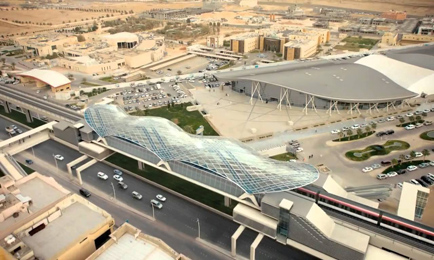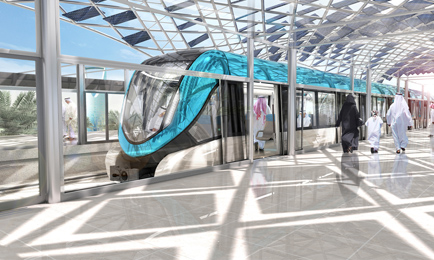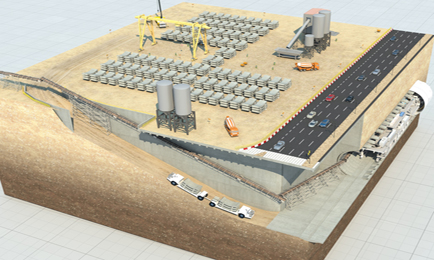Railway companies across the world are preparing for the world’s largest transport infrastructure project to start within the next few months in Riyadh, Saudi Arabia,
Riyadh, today, has a minimal amount of public transport. Only 2% of its 7.4 million daily commutes are done on public transport. The price of petrol in the city is around 9p a litre. The average temperature is 36ºC, hardly conducive conditions for sitting on a packed bus or metro train. Yes, the car is king in Riyadh.
But, the city is growing. It’s population has more than doubled since 1990 to 5.7 million, and is set to hit 8.3 million by 2030. In addition Riyadh has regional ambitions to rise in status to become the Gulf’s financial and administrative centre.
“Riyadh today is one of the world’s fastest growing cities,” says Ibrahim Bin Muhammad Al Sultan, President of Arriyadh Development Authority and Member of the High Commission for the Development of Arriyadh. “The Riyadh Public Transport Project will be a major driver of employment and economic development. It will also help to reduce traffic congestion and improve air quality.
“This is the biggest infrastructure project to be undertaken in the Kingdom of Saudi Arabia and is a cornerstone of the bold future we envision for our city,”
So, within four years, Riyadh will have a 176 km metro system plus a new bus network and park-and ride-services. The most attention is focussed on the $22.5 billion metro project, which when construction starts in January or February, will be the biggest transport infrastructure project in the world, employing 15,000 at its peak.

The Metro will have six lines, dissecting the city from east to west and north to south and be entirely driverless. The design and construction of the Riyadh Metro is a great example of the international nature of civil transport projects. It involves architects, management consultants, construction firms, rolling stock suppliers and railway technology firms from the Middle East, Europe, the US and Asia. The companies are arranged into consortiums that will build the six separate metro lines simultaneously. These consortiums are being managed by two groups of design and management consultants.
The construction of Lines 1, 2 and 3 is being managed by the Riyadh Metro Transit Consultants, a joint venture between US firm Parsons and French companies Egis and Systra. This half of the Riyadh Metro is worth $14.66bn and includes the north - south Line 1, which is mostly underground, the east - west Line 2, which will be mostly elevated track above roads, and the 40.7km east - west Line 3, which is the longest section of track on the network.
Rolling stock for Lines 1 and 2 is being supplied by Siemens as part of a $2bn contract which also includes the design and supply of the signalling and track electrics. The company is supplying 74 Inspiro aluminium-bodied trains. These trains will be fully automatic and, vitally, feature high capacity air conditioning with bespoke seals and filters to reduce the ingress of sand on the bogies, traction drive, brakes and doors.
 The two and four car Inspiro trains will operate at speeds of up to 90 km/h at 90 second intervals, carrying up to 21,000 passengers per hour.
The two and four car Inspiro trains will operate at speeds of up to 90 km/h at 90 second intervals, carrying up to 21,000 passengers per hour.
Metro Line 3 runs through and connects Riyadh’s financial district to the rest of the city and will be a mix of underground, surface and elevated track that. Line 3 is the showpiece for the entire project, and the designs for its stations, produced by Zaha Hadid Architects, are amongst the most futuristic.
Bombardier is building the rolling stock for Line 3, 47 two car sets of the latest generation of its Innovia Metro train in a €289 million contract. The Riyadh metro will be the first time the Innovia Metro 300 design is being used, although earlier variants of the train are used in Kuala Lumpur, Tiapei, New York and Vancouver. It has an aluminium frame, will use the company’s “Mitrac” propulsion technology and will integrate with an Automatic Train Control system for driverless operation installed by Italian firm Ansaldo STS’s.
Bombardier is also supplying a monorail system covering Riyadh’s financial district. The 3.6km system uses the Innovia driverless monorail system which is normally used at large international airports.
The construction of the other half of the metro system, Lines 4,5 and 6, is being managed by US consultancies Louis Berger and Hill International and will be built by a group of companies called the Fast Consortium. Fast is being led by Spanish construction firm FCC, in a €16.3bn deal that the company says is “the largest international contract in the history of the Spanish construction industry”. Three tunnel boring machines are being used to construct 10m diameter tunnels for the underground sections. The trains to run on these lines are being supplied by Alstom, which is supplying 69 two-car trainsets of its automated Metropolis vehicle alongside its Urbalis signalling system. Alstom is using its Appitrack mechanised track laying technology and its HESOP substation system for handling regenerated electricity on the three lines.

Lines 4,5 and 6 will be a mix of underground and elevated viaduct sections with a total length of 64.6km and 25 stations. The 29.6km Line 4 will link the King Khalid International Airport in the north to the Financial district travelling and runs above ground. Line 5 will run underground north-south for 12.9kn in the centre of the city and features 10 stations, with two transfer stations with Lines 1 and 2. Finally Line 6 will be a 29.9km half ring in the centre of the city which starts at the Financial district, passes out towards the Imam Mohamed Bin Saud University and ends in the south. It runs mostly underground with eight stations and three transfer stations.
Whether stunning station designs and fully air conditioned carriages will tempt commuters out of their cars in Riyadh will be seen in 2018. However, Riyadh’s metro is the largest of several rail projects announced in the Middle East this year. In total there are plans to build more than 33,712km of mainline routes and 3,004km of metro, monorail and tram lines in the Middle East and North Africa region. The Riyadh Metro is ahead of a boom in rail transport in the region, the benefits of which are being felt by the rail industry around the world.
Riyadh metro network in numbers: - Overall budget €16·3bn
- Six lines
- 176 km of track
- 600 000 tonnes of steel, the equivalent of 80 Eiffel Towers
- 4·3 million m3 concrete, the equivalent of 11 Burj Khalifas
- 30 000 workers during construction
- Build in five years